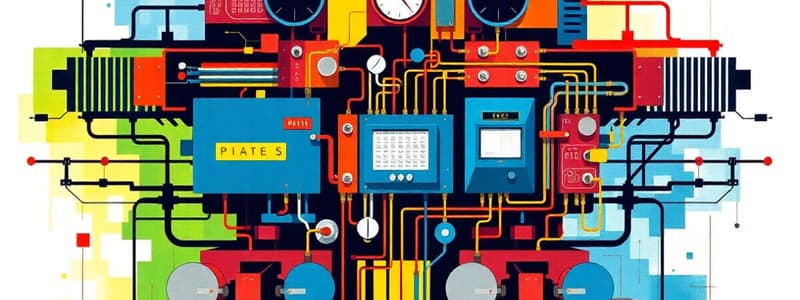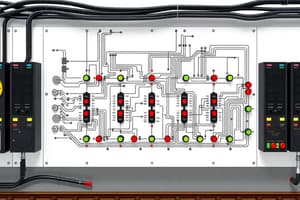Podcast
Questions and Answers
What is the preferred method for housing the panel processor?
What is the preferred method for housing the panel processor?
Which type of cable is advised for connectivity to ensure damage protection from surges and lightning?
Which type of cable is advised for connectivity to ensure damage protection from surges and lightning?
What operating temperature range should the industrial-grade optical modem maintain?
What operating temperature range should the industrial-grade optical modem maintain?
What is required to ensure that earth resistance at the equipment is less than 1 ohm?
What is required to ensure that earth resistance at the equipment is less than 1 ohm?
Signup and view all the answers
What type of surge protection device (SPD) should be ensured for power supplies of Electronic Interlocking systems?
What type of surge protection device (SPD) should be ensured for power supplies of Electronic Interlocking systems?
Signup and view all the answers
What must be done to ensure the proper function of Surge Protection Devices (SPDs)?
What must be done to ensure the proper function of Surge Protection Devices (SPDs)?
Signup and view all the answers
What is the maximum allowable voltage drop from the integrated power supply to the Electronic Interlocking rack?
What is the maximum allowable voltage drop from the integrated power supply to the Electronic Interlocking rack?
Signup and view all the answers
What is the composition of the buried earth conductor mentioned in the guidelines?
What is the composition of the buried earth conductor mentioned in the guidelines?
Signup and view all the answers
How should the DC-DC converters for the Electronic Interlocking system be configured?
How should the DC-DC converters for the Electronic Interlocking system be configured?
Signup and view all the answers
Where should the DC-DC converter be installed to avoid line drop issues?
Where should the DC-DC converter be installed to avoid line drop issues?
Signup and view all the answers
When should the Data Logger be commissioned in relation to the EI system?
When should the Data Logger be commissioned in relation to the EI system?
Signup and view all the answers
What type of supply should the VDU monitor receive?
What type of supply should the VDU monitor receive?
Signup and view all the answers
What should be the isolation requirement for the supply feeding the fans?
What should be the isolation requirement for the supply feeding the fans?
Signup and view all the answers
How should the wires supplying 110V DC power be treated in relation to other cables in the Electronic Interlocking room?
How should the wires supplying 110V DC power be treated in relation to other cables in the Electronic Interlocking room?
Signup and view all the answers
What kind of arrangement is suggested for the VDU PC/Panel processor module power supply?
What kind of arrangement is suggested for the VDU PC/Panel processor module power supply?
Signup and view all the answers
Which of the following statements is true regarding the placement of the DC-DC converter?
Which of the following statements is true regarding the placement of the DC-DC converter?
Signup and view all the answers
What is the minimum level at which the synchronization of the EI clock and data logger clock must be verified and certified?
What is the minimum level at which the synchronization of the EI clock and data logger clock must be verified and certified?
Signup and view all the answers
Which practice is recommended to minimize EMI and EMC effects for the EI input and output cables?
Which practice is recommended to minimize EMI and EMC effects for the EI input and output cables?
Signup and view all the answers
What should be marked on the fuse terminals according to the wiring practice?
What should be marked on the fuse terminals according to the wiring practice?
Signup and view all the answers
What must be separated from the internal power supply in the relay room?
What must be separated from the internal power supply in the relay room?
Signup and view all the answers
During commissioning, which type of system should be planned according to the Railway Board's guidelines to avoid failures?
During commissioning, which type of system should be planned according to the Railway Board's guidelines to avoid failures?
Signup and view all the answers
Who should verify the Factory Acceptance Test (FAT) according to the miscellaneous guidelines?
Who should verify the Factory Acceptance Test (FAT) according to the miscellaneous guidelines?
Signup and view all the answers
What is a crucial requirement for input and output details before commissioning, according to the guidelines?
What is a crucial requirement for input and output details before commissioning, according to the guidelines?
Signup and view all the answers
Where should voltage monitoring cables be routed?
Where should voltage monitoring cables be routed?
Signup and view all the answers
Study Notes
Technical Advisory Note for Electronic Interlocking Installation
- This document supersedes a previous version (STS/E/TAN/3012, Ver. 2.0 dated 10.08.2016).
- It details guidelines for technical system application approval for electronic interlocking installations.
- The guidelines were developed based on analysis of TSAA documents from RDSO over the past 5 years.
- Railways should follow these guidelines for speedy TSAA clearance from RDSO.
Power Supply Arrangement
-
110V DC supply: Duplicate cabling from the IPS room to the El rack is required to prevent voltage drop exceeding 1.0 volt.
- This redundancy is for system robustness and to avoid cable damage from rats or other issues.
- Using appropriate wire gauge and quality is also important.
-
DC-DC Converters: Converters must be segregated for 'A' & 'B' systems, with separate cabling and termination.
- N+1 configuration is recommended for redundancy.
- Using reliable DC-DC converters from OEMs is advised.
- DC-DC Converter Placement: Install DC-DC converters near the El rack to avoid line voltage drops exceeding 0.5 volts. This is for better operation stability.
- Cable Segregation: 110V DC cables should be completely separated from other cables to avoid induced surges.
Electronic Equipment Room
- VDU/Panel Processor Power Supply: 110V DC supply for these components sourced from either the El room or IPS room using duplicated cables and appropriate DC-DC converters.
- Fan Power Supply: Separate, isolated 24V or 110V DC power supply for fans to avoid issues caused by inductive loading on the DC-DC supply of main equipment.
- 230V AC Supply: Separate inverter for 230V AC supply for VDU Monitors with 24VDC input and an AC output with pure sine wave.
Communication Arrangement
-
Panel Processor Placement: Inside the control cum indication panel (CCIP) is preferable.
- OFC cables are suggested for redundancy.
- Communication Cables: El to VDU, CPU to CPU, etc. should be connected using OFC cables to prevent damage and improve reliability (distributed system).
- Analog Monitoring: DC-DC converter output monitoring via the data-logger for preventive maintenance.
Earthing Arrangement
- Class A protection is recommended on building rooftops.
- Copper tape bonding should encompass relay, power and equipment rooms.
- Relay racks and El racks should be interlinked.
- Cable troughs and ladders must be properly earthed.
- Proper SPD (Surge Protection Device) provisions are necessary to ensure proper functioning.
- Cabinets should have copper braided grounding to the bus bar.
Data Logger Installation
- Data Logger needs to be commissioned before the El system.
- All external relay contacts should be wired to the data logger.
- Synchronization between the Data Logger and the El clock through CMU is essential.
- Analog monitoring of DC-DC converter output is part of the data logger setup for preventive maintenance.
Wiring Practice
- Input, output, data, and power supply cables should be routed separately with at least 6–8 inches space between cables in cable troughs.
- Twisted input and output cables are needed to reduce EMI/EMC effects.
- Proper rating and marking of fuses is crucial.
- Surge and lightning protection devices should be installed.
- Wire connections should be properly crimped.
- Separate troughs or ladders are necessary to segregate 110V DC from lower-voltage (12V/24V/50V DC) power cables.
- Voltage monitoring cables should be in separate troughs from other cables to prevent surges from entering the voltage monitoring system.
Additional Notes
- Document verification by JAG Officer and Railway Officials is required before commissioning.
- Technical system application approval documents must be reviewed and signed by authorized Railway official or commissioning company.
- A precommissioning checklist is required to be completed jointly with the equipment manufacturer (OEM).
- OEMs are responsible for quality control, and any installation issues pointed after commissioning must be resolved free of cost by the OEM.
Studying That Suits You
Use AI to generate personalized quizzes and flashcards to suit your learning preferences.
Related Documents
Description
This quiz covers the technical guidelines for electronic interlocking installations, focusing on power supply arrangements and system redundancies. It is essential for railway systems to comply with these guidelines for swift TSAA clearance from RDSO. Understanding these standards can help enhance the reliability and safety of electronic interlocking systems.




